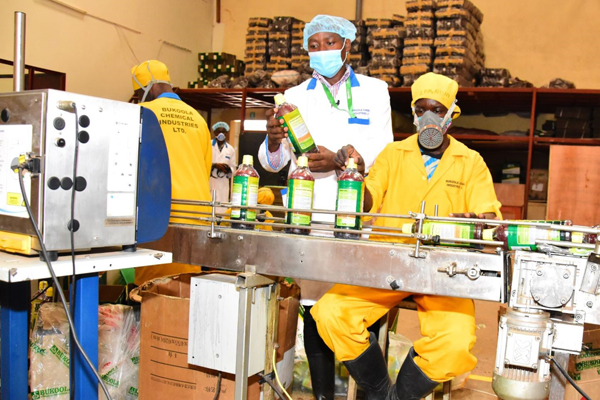Do more to protect farmers from counterfeit agro-inputs

A file photo of a farmer buying seeds from an agro-inputs dealer in Iganga.
What you need to know:
The issue:
Counterfeit agro-inputs.
Our view:
Police operations alone will not weed out rogue agro-input dealers, given the increasing public outcry about counterfeit or expired farm inputs. This calls for a collective effort by all stakeholders involved.
This week, police arrested five people in Kyotera District for allegedly selling fake and expired agro-inputs to farmers. This followed a tip off from informants in the area.
According to drug inspectors from the Ministry of Agriculture, Animal husbandry and Fisheries, the unsuspecting farmers in Kyotera had been buying the fake drugs for long.
But the case in Kyotera is not isolated. Money-minded business people all over the country take advantage of the ignorance of farmers to make a killing, caring less how much damage counterfeit agro-inputs cause the agricultural sector and economy.
According to a recent survey by the Anti-Counterfeit Network, more than 50 percent of the seeds in the marker are fake. What this means is Uganda’s agricultural sector is being grossly affected by this widespread problem.
To put it into perspective, according to government, agriculture employs 65 percent of Uganda’s population and contributes 25 percent of the GDP, which is fundamental to the socio-economic transformation of the country.
This means the escalating influx of counterfeit agro-inputs – including pesticides, acaricides, fertilisers, seeds, and vaccines, among others – has to be stopped with urgency. In the recent past, we have witnessed Ugandan products being rejected by other markets in the region, which some experts blame on the fake agro-inputs in the market.
To deal with this problem that threatens food security and the economy, government should put in place tougher laws and penalties to make it very costly for anyone to knowingly import or sell these fake products.
Government should also consider buying and supplying some of these drugs and pesticides since we are dealing with a problem of this magnitude. We have seen this work in how government controlled the purchase and inoculation of Covid-19 vaccines. Some of these examples could be borrowed.
Farmers should also be sensitised on what to look out for when buying agro-inputs. Having one in every two agro-products in the market fake shows the farmers are ignorant on what is genuine.
Finally, we appeal to everyone to be vigilante and report those selling fake agro-products to the nearest authorities. These phony business people are everywhere and should be stopped if we are to improve the quality of our agricultural products, and also better the money we earn from it.
Otherwise, the police operations alone will not weed out rogue agro-input dealers, given the increasing public outcry about counterfeit or expired farm inputs. This calls for a collective effort by all stakeholders involved.




